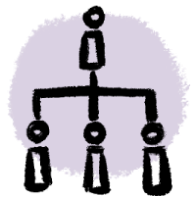
WHAT IS THE CHARTER
The NYC Charter is the foundation of how our City functions and governs, and it has a direct impact on the way we live and work.
Why It Matters
Deep rooted racial inequity impacts every part of New Yorkers’ lives, including health, housing, education, criminal justice, and the environment. The Commission envisions a City where everyone’s worth, talents, and contributions are valued and recognized—and where race no longer determines economic, political, or social outcomes. We have the opportunity to transform the NYC Charter and uproot structural racism.
From the roles of City leaders to how agencies function to how our City tax dollars are spent, the Charter revisions will shape New York City’s future.
The NYC Charter is the foundation of how our City functions and how local government is kept accountable.
The NYC Charter impacts the way we live and work:

Economic Equity

Public Safety & Criminal Justice

Health, Mental Health & Well-Being

Education Equity

Housing & Land Use

Infrastructure & Resiliency

Civic Empowerment & Culture
How the Charter Influences NYC Government
Read the New York City Charter online and learn more about Charter Revision at nyc.gov/charter.

Establishes Institutions
Agencies and Departments, Community Boards, City Council

Sets Procedures
Laws, Local Elections, Public Reviews, Reporting

Directs Power
Decision-making, Participation, Accountability

Distributes Money
Budget, Investments, Contracting
The Charter Impacts:
1
Mayor, Public Advocate, Comptroller
5
Borough Presidents
51
City Council Members
59
Community Boards
141
City Agencies
325,000
Municipal Workers
1,100,000
Students
8,800,000
New Yorkers
Patterns of Inequity
From the public input shared, Commission staff identified how barriers to power, access, and opportunity result in six patterns of inequity for BIPOC New Yorkers. The Commission will prioritize and pursue proposals to address the root cause of these patterns of inequity:
- Inequity in quality services that promote social and emotional wellbeing
- Inequity in work, advancement, and wealth building
- Inequity within and across neighborhoods that inhibits thriving individuals, families, and communities
- Marginalization and over-criminalization of BIPOC Persons and Communities
- Inequity in representation in decision-making
- Enforcement and accountability of government and entities